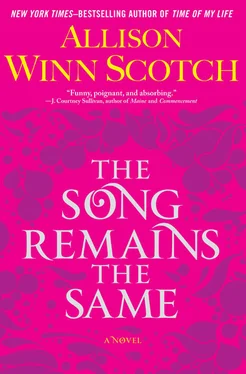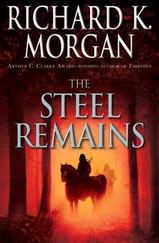“But my mom. She didn’t remember it. Said I couldn’t have remembered it.”
“Well, that’s one of the first rules of journalism,” he says, as we both step closer, peering at the painting once again. “Unreliable narrators: you can never trust someone else when it’s your story to tell.”
Indira is fussing around in the kitchen, slicing up tomatoes from the farmers’ market and laying them out on a platter with mozzarella and basil, when she hears Nell’s footsteps on the back porch and then the screen door slamming and then her daughter—looking so much like the put-upon teenager she used to be—in front of her. Jamie trails behind her, resting a canvas against the dining table, and then exits quietly, lingering on the porch to overhear, but not place himself in the line of fire directly.
“Well, hello to you,” Indira says, trying to maintain the air of composure, but the knife rattling down on the tile counter betrays her. She wipes her hands slowly on a dish towel, the only slow movement she’s made since the company arrived, and Nell, if she were of clear mind, would see that she’s buying some time. But Nell is too angry to see this.
“What’s this?” Indira says finally, her hands still slightly sticky from the residue of the tomatoes. She steps closer to the painting, though she knows perfectly well what it depicts. “Is this one of yours?”
“Yes, Mother, it’s one of mine,” Nell manages. There is a watermelon-colored splotch across her chest—a rush of angry blood, just above the V-neck of her T-shirt. “It’s one of fucking mine, and I’m pretty sure it’s exactly the memory I had, the one I told to you, and of which you denied its existence.”
Indira slides out a chair and sits, and for the first time since the hospital room back in Iowa, looks—just for a fleeing moment—defeated, exhausted, frayed around all the edges. She can feel Nell bearing down on her, but after that flicker of self-doubt, she straightens her spine and tries not to buckle.
It’s not like she hasn’t seen this behavior before, not like she hasn’t beaten it back with a figurative stick for the better half of Nell’s teenage years after Francis left and Nell embraced stoicism, meticulousness, and such tightly controlled anger that you’d never know she was angry in the first place. But let’s not forget about the anger. The endless hours beating the tennis ball against the backboard, her headphones blaring so loudly, you could hear them the next court over. Her abandonment of making her own music, which she had reveled in since she was no more than three, and her abandonment, also, of making her own art, which her father had pushed for her since about that age, too. Yes, Indira had seen all of this before, and she eyes Nell now, and sniffs her nose higher. She won’t cave—she knows her daughter too well, even though she thought that after the crash, well, maybe she was different. That if Nell were to forget all of the scars and the sins, maybe that would change everything, change her.
“Sit down,” Indira says, pointing to a chair.
“I don’t want to fucking sit down,” Nell says.
“Nell, darling, please calm down. And the language. There’s no need for that language.”
Nell chews on her bottom lip, debating whether to listen to her mother or indulge her own rage.
“Well, if I’m being honest,” Indira continues, when Nell still refuses a seat, “I’d completely forgotten about that painting. And furthermore”—her voice elevates just a tinge here, and if Nell remembered her mom as she should, she’d know that this was her tell, her giveaway—“I didn’t even remember that house when you told me your dream.”
“It wasn’t a dream, Mother. It was a memory,” Nell barks. “And given my circumstances, that’s a pretty big goddamn distinction.”
“Please stop talking to me that way. I hate it when you’re angry—this is the you of your past! We moved beyond that. You told me! You told yourself: the new you!” But Nell’s face is metal, unrelenting, and Indira realizes this distinction is of no consequence to her right now. That there have been moments that were, but this isn’t one of them. “I really didn’t remember, and when I finally did, it was only a day or so ago, and I was thinking of your best interest in not bringing it up.”
Nell snorts at this, and Indira sips her tea and mentally counts to ten. Of course she isn’t telling her the full truth, though it’s not just in Nell’s best interest—it’s in all of their best interest. Of course she remembered going down to that piece of shit house and retrieving the kids in a flurry of panic. Of course she hadn’t forgotten Nell’s choice, and how it was always about Francis and not about her—her own goddamn mother!
Indira says none of this, and instead offers: “Has your therapist suggested yoga for you? I very much think it could help.”
“Shut up, Mother, and tell me about the house!”
Indira stares at her for a second, debating. Nell is slipping back—here’s the proof—already being tucked behind old habits. The anger! The distrust! Telling her the truth would push her farther down the rabbit hole, and Indira’s been there, tried to rescue her before. When she woke up that morning to Francis’s note that he was leaving—this time for good—she considered telling the girls that he had died suddenly but instead sat them on the couch and prepared a plate of shortbread and 7-Up, and bore witness to the axis in Nell’s world grinding to a halt. In the months, many, many months that followed, she tried to introduce her to meditation and suggested family therapy, but there was no budging on her end. There wasn’t space for forgiveness of her father’s faults or of the fact that he couldn’t control himself, that his brain and his wiring and his chemistry forced him to choose a more solitary path. No, Nell just zipped herself up, and soon enough she was defined by her hard edges, her backbone made of steel. Nell was his muse, and he was her life. There was no forgiving that.
Finally, Indira blinks and inhales. She will tell her, she thinks, in bits and pieces, dribble out enough to inform her, not enough to snap that rigid backbone upright all over again. But before she can say anything, the front door squeaks open and Rory and Hugh shout, “Hello!”
“What are we interrupting?” Rory says, her enormous black sunglasses perched atop her head, her legs skinny and lean in denim cutoffs. Indira feels a wave of pity for Nell, at her younger sister’s beauty and how, though she was smarter and certainly pretty in her own way, she would never live up to it. And never live up to her father’s projected expectations, either. Is it any wonder she grew so far removed?
“Mom is telling me about the house.”
“The house? Oh, that’s a good idea,” Rory says, moving to the fridge to get a beer while Hugh juts his head in for a quick hello, then hauls their bags upstairs. “There’s probably a lot here that might help with your memory.”
“Not this house,” Nell says. “I found this painting.”
Rory pops the top of her bottle and swigs, moving toward the table and eyeing the canvas. “I’ve never seen this.” She steps back and assesses. “It’s not bad. I mean, I wouldn’t buy it for the gallery or anything, but still, it’s not total shit.”
“Rory!” Indira snaps. “Please.”
“What? It’s true. And by the way, you’re welcome for saving you from Peter the other night.”
“What are you talking about?” Nell says, and Indira feels herself relax, thinking she might just dodge the bullet. Yes, let’s talk about anything other than this goddamn house.
Читать дальше












